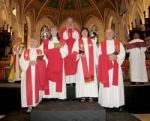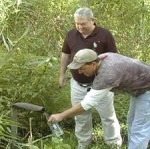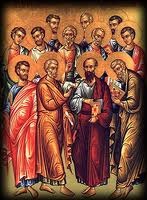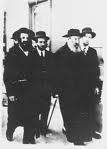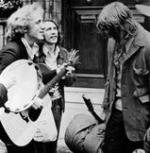A Look at Kent Hunter’s “The Future Is Now: How God Is Moving In The 21st Century Church
 I came across an ebook by Kent R. Hunter of Church Doctor Ministries entitled “The Future Is Now: How God Is Moving In The 21st Century Church.” I would like to quote from this source since it is so good, and then add a few of my analysis to it.
I came across an ebook by Kent R. Hunter of Church Doctor Ministries entitled “The Future Is Now: How God Is Moving In The 21st Century Church.” I would like to quote from this source since it is so good, and then add a few of my analysis to it.
From Chapter 7 – Church As A Movement, Hunter says: “Witnessing, in the true sense — what Jesus says in Acts 1:8 — is the key. This means that one of the most revolutionary and powerful “evangelistic programs” any church in the 21st century can accomplish is to patiently, gently, and continually ask people to share what God has done in their lives lately. In time, that becomes a cultural lifestyle for everyone in the church. In the early stages of the spiritual journey, witnessing does not include Bible passages or preaching. What receptive and interested people want to hear is how God has worked in your life recently. Witnessing has become much easier and must become, once again, the lifestyle of all Christians — not a program, effort, or the pre-occupation of just a committee.”
As a retired English teacher, I love narratives. I have taught them, wrote about them, and even written them. Narratives have always been an effective way of just telling one’s personal story. The four gospels are basically narrative accounts of experiencing Jesus’ life on earth and the book of Acts, a narrative of the birth of the Church. As a child at church, I remember singing the old church hymn “I Love To Tell The Story”. Is the power of the narrative coming back?
 In the 1980’s I was part of the Lay Witness Movement through the Board of Discipleship of the United Methodist Church. Lay Witness Missions were basically teams of laity who were invited to invade a local church for a weekend to stay in the homes of the locals, participate in small group discussions, fellowship over pot luck, cover dish dinners, and share their personal narratives of what Jesus was doing in their lives. It was a powerful ministry. Common people, the saints of the Church, shared their narratives with one another for an entire weekend. Even the Sunday sermon was replaced by someone sharing their personal testimony and allowing response to it.
In the 1980’s I was part of the Lay Witness Movement through the Board of Discipleship of the United Methodist Church. Lay Witness Missions were basically teams of laity who were invited to invade a local church for a weekend to stay in the homes of the locals, participate in small group discussions, fellowship over pot luck, cover dish dinners, and share their personal narratives of what Jesus was doing in their lives. It was a powerful ministry. Common people, the saints of the Church, shared their narratives with one another for an entire weekend. Even the Sunday sermon was replaced by someone sharing their personal testimony and allowing response to it.
In 1993 I got to go to South Africa for 16 days at the invitation of the United Methodist in South Africa to participate in Lay Witness Weekends in Pretoria and Capetown during the elections when Mandella was running for President. I could fill blog pages telling of the power of that movement and trip. I do remember that South African Missioners, as they were called, or South Africans who would share their testimony or narratives at these weekends, had what I called “canned” testimonies. They recited their narrative to their coordinator just as they would always recite it if called to share. We, Americans, on the other hand, would not just give our “salvation story” but also what Jesus was doing in our lives now. We would go with the flow of the Holy Spirit, sharing differently each time we were called.
I did not know it, but we were under the South African Church’s microscope during those missions. I remember getting a thank you note when returning back in the states. Included were reflections on their part of what they observed from the weekends. I was fascinated by one comment, “there is freedom in Holy Spirit.” They saw the power of sharing our narratives in the “now” rather than reciting a planned dissertation.
I love to tell my stories: how I accepted Jesus, the need for more empowerment in my spiritual walk, wrestling with the supernatural in my natural world, the physical healing of being burned by the hot water from a car radiator, how I prayed with a man in the Super Dome in New Orleans who was healed instantly, how my 10 year old son gave prophetic words to a lady changing her life, my Lay Witness Weekend Missions to well over 50 local congregations, my trip to South Africa, leading a Bible School parade in Jamaica through their small town, going from not being able to physically talk about Jesus to one who can’t be quiet now, etc., etc., etc.
 I sit in the church I currently attend that has approximately 350 people attending, and am shocked that I can not tell you the personal stories of more than five people in that congregation. I wonder, “Who are these people? How did they get here? How did they get to know Jesus?” Where are they in their spiritual walk?” Churches need to allow the saints to tell their stories, so their brothers and sisters in the Lord can know who they are in Jesus.
I sit in the church I currently attend that has approximately 350 people attending, and am shocked that I can not tell you the personal stories of more than five people in that congregation. I wonder, “Who are these people? How did they get here? How did they get to know Jesus?” Where are they in their spiritual walk?” Churches need to allow the saints to tell their stories, so their brothers and sisters in the Lord can know who they are in Jesus.
It is good to see that Mr. Hunter recognizes the need for the return of the narrative. In the ‘70’s, Christian testimony books like The Cross And The Switchblade and The Gentle Breeze of Jesus were powerful narratives that influenced my Christian walk. I even wrote and published I Was A Stranger And…., a narrative account of the Ilgenfritz family taking in to their personal home and lives over 100 people over a ten year period including my wife and I and the birth of our oldest son. Christian publishers shy away from printing narratives today, yet the narrative still has the power of being personal, being about a real person, being just a story, and being an effective tool of evangelism.











